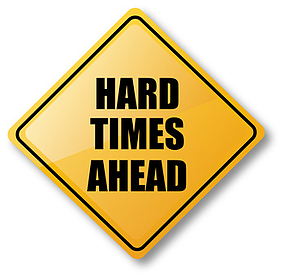When you’re going through a rough patch in your life, it’s hard to work up the motivation to do just about anything. Routines become harder to maintain, and activities you enjoyed in the past may fall by the wayside. You’ll almost certainly become more introspective, taking inventory of your life and its contents. It’s absolutely critical during hard times that you keep things in perspective and maintain a healthy sense of self worth so you don’t hastily make drastic changes in your life. Whether you’re having problems in your personal relationships, at the job, or with your general life goals, you need to remind yourself that these feelings are normal.
just about anything. Routines become harder to maintain, and activities you enjoyed in the past may fall by the wayside. You’ll almost certainly become more introspective, taking inventory of your life and its contents. It’s absolutely critical during hard times that you keep things in perspective and maintain a healthy sense of self worth so you don’t hastily make drastic changes in your life. Whether you’re having problems in your personal relationships, at the job, or with your general life goals, you need to remind yourself that these feelings are normal.
Let me ask you something: have you considered recording your feelings?
Why I journal
When I’m going through a particularly difficult period in my life, I take advantage of my intensely introspective state by maintaining a daily mood journal. Whenever I catch myself sitting up at home and doing nothing but sulking and reflecting on the day’s events with a bitter taste in my mouth, I reach for my journal and attempt to put those feelings on paper. Disappointing moments on my career path, regrets over what I said to a friend, angst over finances: all these things take on a different light when they fill a journal. After they’re written into the journal, dark thoughts lack a bit of their gravity and become more manageable. I use the journal to write myself through hard times, cataloguing every relevant thought and event like a traveler at sea logging the happenings of the day.
A useful tool for anyone
I firmly believe that anyone can reap the benefits of a mood journal. Of course, keeping up a journal might be the last thing you want to do when you’re in the depths of a deep slump. If you can get past the initial effort that it takes to buy the necessary supplies (nothing more than a pen and a lined journal that strikes your fancy), the rest is easy. All you must do is take the plunge and make your initial entry. Luckily there’s really no wrong way to write a mood journal; what matters is that you write about yourself and your musings from a blunt and honest perspective. If you’re depressed, speculate on the source of your feelings in whatever writing style feels the most comfortable.
Feel free to let your mind roam the pages of your journal uninhibited by traditional writing standards. The journal is for your reference and your reference alone; think of it as a therapeutic exercise where you are the patient and the journal is the therapist, silently absorbing your thoughts and opinions. If you maintain your journal on a fairly strict schedule, soon you’ll have a host of writing. You’ll find that when you refer to the negative thoughts, anxieties, and fears logging within your mood journal that they lose their power. You’ll be relived to reread entries that seem completely irrational in retrospect, giving you renewed confidence in your outlook on life.
So why don’t you give it a try?
By-line:
Alvina Lopez is a freelance writer and blog junkie. She welcomes your comments at her email: alvina.lopez @gmail.com.
If you want to learn how journaling can help you tackle life's challenges and navigate hard times, please download the free eBook, The Journaling Guide to Manage The Stress and Strains of Life.
Learn how to identify and navigate the obstacles in your life with our Reset & Recharge Your Life in 7 Days self-paced journaling course.



Leave Comment